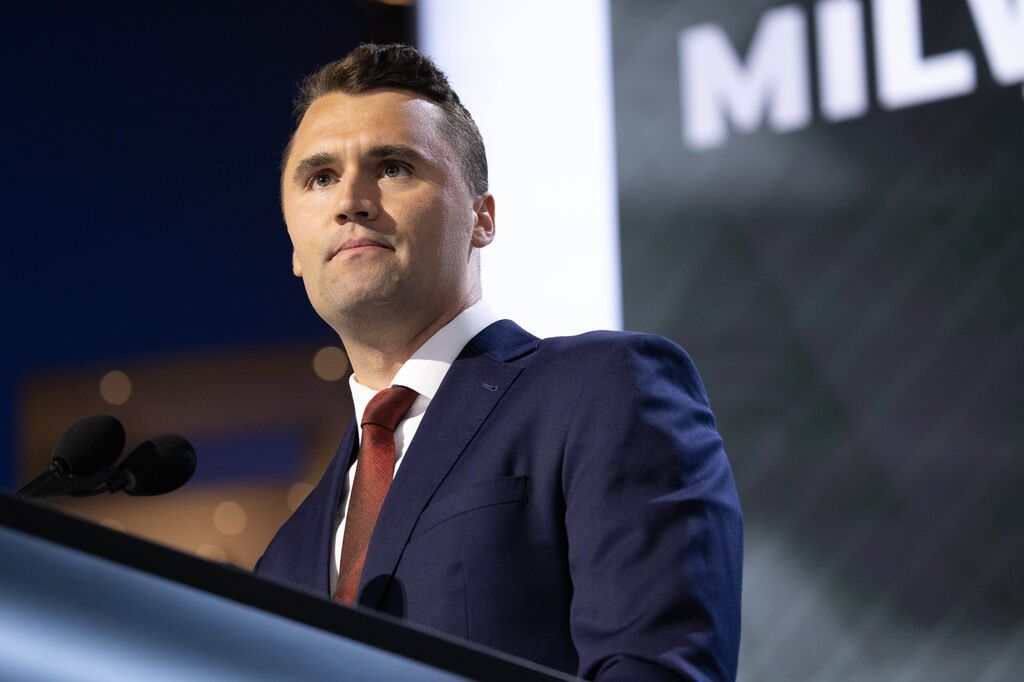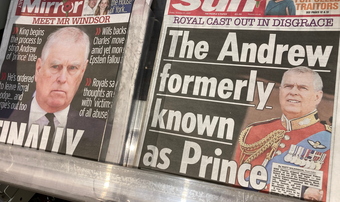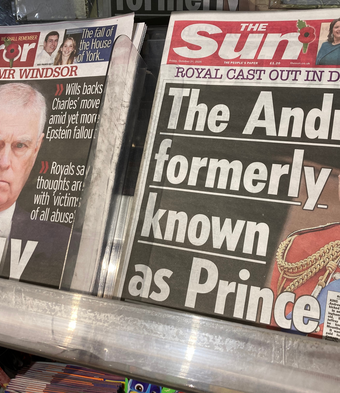The murder of Charlie Kirk

A couple of days ago, I had never heard of Charlie Kirk. Now, there will be few who haven’t heard of him.
On Wednesday 10th September, the right-wing debater, activist and free-speech advocate was shot in the neck while debating students at Utah Valley University. He died shortly afterwards.
The Washington Editor for The Times began their article on Wednesday night: “Who is the most influential young person on the right in America? For a few years now, the answer has been Charlie Kirk.”
Kirk made his name as the founder of Turning Point USA, an American Conservative youth movement which began in 2012 and which has a particular focus on schools, colleges and universities. As time went on, he attracted an audience of over 7 million followers on TikTok and spoke abroad (including, this year, at the Oxford Union and Cambridge Union). He also developed ‘Prove me wrong’ debates, in which college students could debate him on controversial matters such as immigration, climate change, and LGBT rights.
He also had close links with the Trump administration: having initially acted as bag-carrier during the 2016 Presidential election, he maintained close links and continued to support Trump after the riots in 2021, repeating his claims of voter fraud; last year Trump credited him with mobilising young people to vote for him in key swing states such as Michigan. The stats bore it out: one TikTok survey found that among under-30s who had voted for Trump in 2024, Kirk was the most trusted individual.
When his death was confirmed, the President wrote on his social media platform, Truth Social: “The Great, and even Legendary, Charlie Kirk, is dead…No one understood or had the Heart of the Youth in the United States of America better than Charlie.”
There is much which, at the time I write this, is still unknown; the killer has only just been apprehended, and his motivations are not yet ascertained. However, it does seem that this was a premeditated shooting, conducted by someone who was acting as a sniper on a roof, more than 100 yards away; it was not something conducted in a rush-of-blood, or in response to an in-the-moment comment, but a cold, calculated decision to murder an outspoken conservative voice for the views they hold.
Kirk held a number of views which were controversial; some of those we will agree with, such as his perspectives on gender ideology, or his strong pro-life beliefs. Others of them were more provocative, such as his apologism for Putin in the war on Ukraine or even some of his comments about race and the murder of George Floyd.
But the point is simple: none of it matters.
Not just an American problem
The USA (and here, in the UK), is a country governed by the rule of law, and a nation in which everybody has the right to free speech. It is this, ironically, which Charlie Kirk was well-known for: if you didn’t like what he had to say, he invited you to talk to him about it, and try and convince him otherwise.
It should go without saying - but clearly for some people, the blindingly obvious does actually need to be said - that political violence is never, ever acceptable. It has been positive to see political leaders from across the spectrum, including former Democrat Presidents Joe Biden and Barack Obama, and politicians here in the UK, including Keir Starmer and Yvette Cooper, releasing comments deploring it.
But the grim world of social media tells a different story; some of the comments I have seen on X (formerly known as Twitter) reveal the almost cult-ish way in which some people are more wedded to their political beliefs (and their own confidence in being right) than they are to their common humanity.
Some asked why there was the outpouring of grief over one life in the USA than over the deaths in Gaza; others pointed to Kirk’s own well-known support of America’s gun laws. The worst dared to say that he had it coming. The most common reaction to the Guardian’s piece about the murder was telling: a laughing emoji.
In the last 24 hours, a story has broken about how the incoming President of the Oxford Union, who had himself debated Kirk in-person just months ago, initially posted on Instagram: “Charlie Kirk got shot loool”. Ladies and gentlemen, one of the leaders of tomorrow...
It would be tempting to write Charlie Kirk’s murder off as an American problem; it’s the land of Abe Lincoln and JFK, a land in which different political tribes view each other with little short of hatred, and the land of liberal gun laws and the Second Amendment. It’s not long since Donald Trump himself survived an assassination attempt. Is it the kind of thing which just happens over there?
The UK and the USA are not identical. But the links between the two - particularly in a globalised world, where video clips of an assassination circulate around within minutes - are not insignificant either.
I remember hearing the historian Tom Holland speak at an event a few years ago about how he felt the UK was increasingly becoming a bit like an American colony: where America led, the UK would follow. To some extent, we already see that within British politics, with Nigel Farage adopting political tactics from the Trump playbook; or on the other side of the spectrum, the way in which the Black Lives Matter protests were adopted en masse here in the UK, when their original context was a peculiarly American one.
To write this off as being just about America would be a mistake. In the last decade, two MPs have been murdered. Many more have been credibly threatened.
At CARE, we have just released a new Topic Guide, which those of you who receive Ross’ letters will be sent in the post: it includes an article by our Director of Advocacy and Policy Caroline Ansell, who writes about her time in Parliament, and includes a section about the threats she faced, which I reproduce here.
“Is the risk all hyped up? In 2017, when a local man went to prison for threatening to kill me, it was the first case of its kind in the country. By the time I left the House of Commons in 2024, it was two-a-penny…
…As a legacy of my time in Parliament, I have a sizeable bag attached to the letterbox of my front door which deals with incendiary devices and a panic button (now disconnected!) by my bed.
And for all its many benefits, I’m afraid social media would go into my Room 101. There’s something particularly pernicious about nameless, faceless adversaries: those keyboard warriors who stalked my every post, and were so relentless in their judgment and hate, could well have been the person sitting opposite me on the train, behind me in the queue at Sainsburys, serving me in the pub.”
Just yesterday, a story broke about a Labour MP’s constituency office (Sharon Hodgson, MP for Washington and Gateshead South) being burned down in a suspected arson attack. Please do continue to pray for our politicians, and, as the Charlie Kirk case demonstrates, for those in wider public life.
There is a reason why at CARE we so often speak about the need for both truth and grace; the importance of both balancing convictions and civility: the public square is becoming increasingly unsafe.
Not just a left-wing problem
And it’s why what happens next here is so important. I found some of the immediate responses by key figures to be pretty concerning. Within hours, Elon Musk tweeted that “The left is the party of murder”. In his speech, President Trump rhymed off a range of people who have been killed in recent months, and finished by saying: “Radical left political violence has hurt too many innocent people and taken too many lives.”
But violence is not just a problem confined to one side or the other. Three months ago, Melissa Hortman, the speaker of the Minnesota House of Representatives, and a member of the Democrats, was shot dead, alongside her husband. It followed a similar attack just hours earlier on the State Senator John Hoffman and his wife.
At the time, Elon Musk tweeted “The far left is murderously violent” and Donald Trump Jr said that the suspect “seems to be a leftist” and was “a Democrat”. It subsequently emerged that the murderer was actually a Trump supporter, and that the attack was politically motivated: he had a list of 70 potential targets in his van.
Here in the UK, Labour MP Jo Cox was murdered in 2016, just days before the Brexit Vote by a white supremacist who shouted “Britain first”. Political violence is not confined to just the left; Aleksandr Solzhenitsyn once famously wrote: "The line separating good and evil passes not through states, nor between classes, nor between political parties either—but right through every human heart—and through all human hearts".
The danger when someone on ‘our side’ (whichever that is) is targeted, is to lash out and to blame the ‘other side’, without space for self-reflection.
Donald Trump quite rightly said in his speech: “For years, those on the radical left have compared wonderful Americans, like Charlie, to Nazis and the world's worst mass murderers and criminals. This kind of rhetoric is directly responsible for the terrorism that we're seeing in our country today, and it must stop right now.”
I wholeheartedly agree: words have meaning. When people tweet things like ‘TERFS must die’, it is no surprise that eventually somebody takes them at their word.
But we also cannot pretend that all those on the right are innocent in this regard either; and the irony of it being President Trump who is asking for a dialling-down in rhetoric should not be lost on anybody (this being the man who just a couple of months ago accused the former President Barack Obama of ‘treason’).
Truth and grace means truth and grace to everyone, regardless of who they are, what they do, and what they might think. To love our neighbour as ourself means not just calling out the 'radical leftists', but considering the impact of our own speech on those around us.
Paul writes in Colossians about how as Christians, we are to speak to non-Christians (aka people who have a different set of values to us): “Let your conversation be always full of grace, seasoned with salt, so that you may know how to answer everyone.” (Colossians 4:6)
Everyone means everyone.
Not just about being ‘right’
What leads someone to the point of murdering another human being over the views they hold?
I’ve been reflecting on that question over the last couple of days: surely someone must possess such a sense of moral certainty, such an inner confidence that they are right, and that their opponents are wrong.
And then they must be sure not just that they are right, but that their opponents are not just factually wrong, but morally wrong as well: their very existence is an evil, a blight which must be eliminated.
The lack of humility, the lack of self-doubt, the unwillingness to listen to others and the utter dismissal of any opponents as being sub-human: they’re typically the hallmarks of what we might think of someone who has been indoctrinated into a cult.
The irony of it all is this: someone who is so sure that they are in the right (and depending on the issue, they might be), sinks to far greater depravities than the person they have so little regard for.
There’s a famous sketch from ‘That Mitchell and Webb Look’, in which two Nazis, played by David Mitchell and Robert Webb, have a sudden epiphany, when one of them asks the other, with a tone of surprise: “Hans…are we the baddies?”
I hope that the murderer in this case stops to reflect on what he has done, and realises that he has made himself the villain.
Debate should never just be about winning arguments: it should never just be about who is right, and who is wrong. It is also about the character we exhibit in the process.
I have been spending the last few days reading through the gospel of Matthew; a couple of nights ago, I re-read Jesus’ words in Chapter 23 to the Pharisees, who were so obsessed with being right on some of the minutiae of the law. Jesus had strong words for them:
“Woe to you, teachers of the law and Pharisees, you hypocrites! You give a tenth of your spices—mint, dill and cumin. But you have neglected the more important matters of the law—justice, mercy and faithfulness. You should have practiced the latter, without neglecting the former. You blind guides! You strain out a gnat but swallow a camel…
“Woe to you, teachers of the law and Pharisees, you hypocrites! You are like whitewashed tombs, which look beautiful on the outside but on the inside are full of the bones of the dead and everything unclean. In the same way, on the outside you appear to people as righteous but on the inside you are full of hypocrisy and wickedness.”
Those who practice political violence have such a sense of certainty that they are the righteous ones; when in reality, they neglect “the more important matters”. Inside they are “full of hypocrisy and wickedness.”
What happened to Charlie Kirk is a tragedy: there is now a wife without a husband and two children without a father.
Charlie Kirk was also a follower of Jesus: witnesses who were there described how, shortly before he was killed, he spoke about Jesus, the Cross, and the need for forgiveness to a mostly Mormon audience.
Let us pray that the forgiveness which lies at the heart of our faith might percolate our broken societies once again; that violence might not breed more violence; that we might no longer see our political opponents as enemies; and that we might help bring about a world of reconciliation and healing, in a foretaste of the new world God will one day bring to pass.






